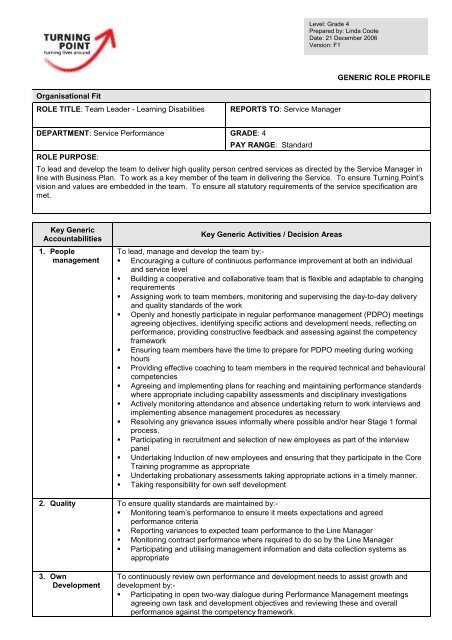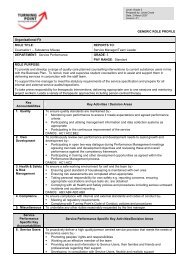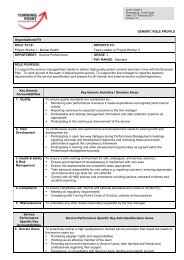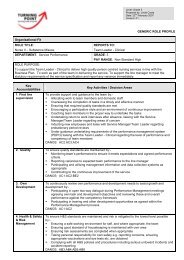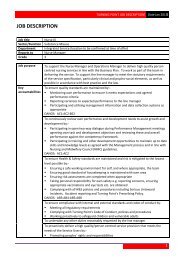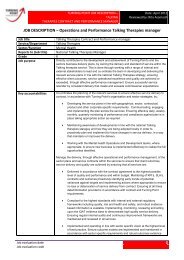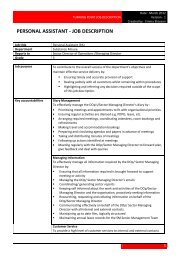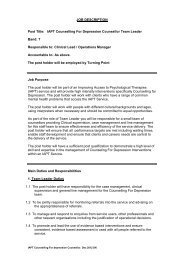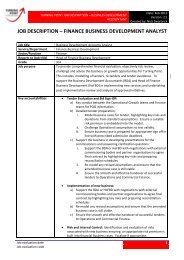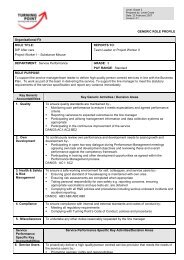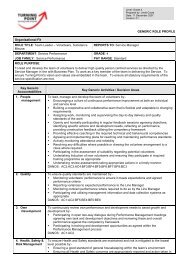"Generic Role Profile - Team Leader - Service Performance + ...
"Generic Role Profile - Team Leader - Service Performance + ...
"Generic Role Profile - Team Leader - Service Performance + ...
Create successful ePaper yourself
Turn your PDF publications into a flip-book with our unique Google optimized e-Paper software.
Level: Grade 4Prepared by: Linda CooteDate: 21 December 2006Version: F1GENERIC ROLE PROFILEOrganisational FitROLE TITLE: <strong>Team</strong> <strong>Leader</strong> - Learning DisabilitiesREPORTS TO: <strong>Service</strong> ManagerDEPARTMENT: <strong>Service</strong> <strong>Performance</strong> GRADE: 4ROLE PURPOSE:PAY RANGE: StandardTo lead and develop the team to deliver high quality person centred services as directed by the <strong>Service</strong> Manager inline with Business Plan. To work as a key member of the team in delivering the <strong>Service</strong>. To ensure Turning Point’svision and values are embedded in the team. To ensure all statutory requirements of the service specification aremet.Key <strong>Generic</strong>Accountabilities1. PeoplemanagementKey <strong>Generic</strong> Activities / Decision AreasTo lead, manage and develop the team by:-• Encouraging a culture of continuous performance improvement at both an individualand service level• Building a cooperative and collaborative team that is flexible and adaptable to changingrequirements• Assigning work to team members, monitoring and supervising the day-to-day deliveryand quality standards of the work• Openly and honestly participate in regular performance management (PDPO) meetingsagreeing objectives, identifying specific actions and development needs, reflecting onperformance, providing constructive feedback and assessing against the competencyframework• Ensuring team members have the time to prepare for PDPO meeting during workinghours• Providing effective coaching to team members in the required technical and behaviouralcompetencies• Agreeing and implementing plans for reaching and maintaining performance standardswhere appropriate including capability assessments and disciplinary investigations• Actively monitoring attendance and absence undertaking return to work interviews andimplementing absence management procedures as necessary• Resolving any grievance issues informally where possible and/or hear Stage 1 formalprocess.• Participating in recruitment and selection of new employees as part of the interviewpanel• Undertaking Induction of new employees and ensuring that they participate in the CoreTraining programme as appropriate• Undertaking probationary assessments taking appropriate actions in a timely manner.• Taking responsibility for own self development2. Quality To ensure quality standards are maintained by:-• Monitoring team’s performance to ensure it meets expectations and agreedperformance criteria• Reporting variances to expected team performance to the Line Manager• Monitoring contract performance where required to do so by the Line Manager• Participating and utilising management information and data collection systems asappropriate3. OwnDevelopmentTo continuously review own performance and development needs to assist growth anddevelopment by:-• Participating in open two-way dialogue during <strong>Performance</strong> Management meetingsagreeing own task and development objectives and reviewing these and overallperformance against the competency framework.
• Participating in training and development opportunities as agreed within the<strong>Performance</strong> Management process4. Health, Safety &Risk ManagementTo ensure Health and Safety standards are maintained and risk is mitigated to the lowestlevel possible by:-• Ensuring a good standard of general housekeeping within the team’s environment• Ensuring all H&S concerns are appropriately reported and action taken in a timelymanner• Ensuring that task-based and, where appropriate, clinical risk assessments and reviewsare undertaken, and that identified risks are managed and mitigated where possible• Ensuring full compliance with all Health and Safety requirements within the team• Participating in regular reviews of the business continuity plan where appropriate• Ensuring staff take personal responsibility for their own and others safety e.g.vaccinations, eye sight tests, work place assessments• Ensuring that staff comply with partner H&S policies and procedures where appropriate• Following the formal reporting process for serious untoward incidents and accidents5. Compliance To ensure compliance with internal and external standards and codes of conduct by:-• Meeting all regulatory requirements• Complying with Turning Point’s Code of Conduct, policies and procedures6. Miscellaneous Undertake any other duties reasonably requested by the line manager<strong>Service</strong><strong>Performance</strong>Specific KeyAccountabilities7. <strong>Service</strong> specificoperationalsupervision8. <strong>Service</strong> usercase work9. FinancialControl<strong>Service</strong> <strong>Performance</strong> Specific Key Activities/Decision AreasTo provide effective operational supervision by:-• Ensuring that the team works to Turning Point and/or other external national standards(as relevant), so that the correct standards and quality of care are maintained• Ensuring service user involvement and a person centred approach are embeddedwithin the day to day working of the team• Providing professional guidance and coaching on case management• Participating in regular audits (internal and external) and ensure results are acted uponwithin the team.• Monitoring KPIs, SLAs, contracts and outcomes identifying variances against targetsand reporting same to <strong>Service</strong> Manager• Ensuring all services are delivered within LDAF guidelinesTo monitor the case work of team members ensuring it meets required quality standardsand undertake own case work, depending on the project requirements by:-• Monitoring the case work of team members ensuring it meets required quality standardsand undertaking own case work, depending on the project requirements• Carrying out service user assessments and admissions, develop and regularly reviewcare plans, and be an advocate on behalf of service users• Carrying out risk assessments e.g. for an activity or for a specific service user case, andprovide contingency plans• Overseeing the assessment, move in and induction of new service users to the service• Ensuring risk assessments are completed satisfactorily by Project Workers and SupportWorkers• In the case of a difficult or complex service user, or as a part of formal supervision,providing support and coaching to Project Workers and Support Workers, e.g. helpingto make the difficult service user decisions, or be the escalation channel if the situationrequires it• Helping with service user goal planning as part of a multi-disciplinary team whereappropriate• Being a member of the rota, e.g. on call, on shifts, doing hands on work where requiredby the serviceTo monitor team’s expenditure and throughout to contribute to the service maximising fullcost recovery and meet its financial targets by:-• Monitoring team’s expenditure and throughput to contribute to the service maximisingfull cost recovery and meet its financial targets.
• Maintaining accurate financial records, e.g. petty cash, credit card spend• Collating data/information and write regular reports/returns• Contributing to the preparation of budget figures based on income figures and submitfor approval where required10. <strong>Service</strong>development11. Deputising forthe <strong>Service</strong>ManagerTo assist in the development of the service by:• In liaison with <strong>Service</strong> Manager, representing Turning Point at external meetings, andnetwork locally to develop contacts, services and Turning Point’s profile• Working with the <strong>Service</strong> Manager to enhance, develop and expand the service• Putting forward new ideas on service development to the <strong>Service</strong> Manager• Feeding back to the <strong>Service</strong> Manager service-relevant information or intelligenceTo deputise for the <strong>Service</strong> Manager by:-• Attending meetings on behalf of the <strong>Service</strong> Manager• Being the first point of contact in the absence of the <strong>Service</strong> Manager, and resolve theday-to-day issues or escalate to the Locality Manager• Carrying out specific tasks delegated by the <strong>Service</strong> ManagerLearningDisabilitiesLearning Disabilities Key Activities/Decision AreasSpecific Duties12. <strong>Service</strong> Users To ensure the team support <strong>Service</strong> Users to turn their lives around by adopting a personcentred approach by:-• Ensuring all services are delivered in a person-centred way• Ensuring that the team create person-centred plans which reflect and promote theneeds, personal goals and aspirations of individuals• Ensuring that the team proactively support and enable service users to achieve theirpotential• Providing guidance on current regulatory requirements to team members (e.g. ValuingPeople) and how this translates into practice• Providing guidance on the Protection of Vulnerable Adults framework, and ensure that aculture of safe practice is maintained• Overseeing the effectiveness of the promotion, monitoring and review of independentliving through service user’s personal choice, advocacy and support• Promoting an environment which engages with family, carers, and others to facilitateperson centred plans• Promoting and ensuring that the team use effective communication mechanisms forindividuals with Learning Disabilities13. Sector QualityStandardsTo ensure all services are delivered in accordance with recognised standards by: -• Ensuring all services are delivered within LDAF guidelines and Supporting People/CSCIstandards as appropriateResidentialSpecific Duties14. <strong>Service</strong> Users/Tenants15. PropertyManagementResidential <strong>Service</strong>s Key Activities/Decision AreasTo support residential services users/tenants by: -• Providing additional support for service users during their induction period at theservice, completing all necessary paperwork to ‘sign up’ the resident and informingthem of their rights and responsibilities while living at the service• Undertaking any other duties required regarding providing advice on benefits, collectionof rent, etc., from service users residing at the serviceTo ensure the property is effectively and cost efficiently managed by:-• Managing the re-letting of rooms in line with Turning Point’s voids policy includingliaising with referral agencies and taking appropriate action to ensure that the propertyis brought back to use within agreed targets. Where necessary organise the cleaning ofrooms before the room is let• Ensuring appropriate property maintenance is undertaken in accordance with servicetenancy agreement and as approved by the <strong>Service</strong> Manager
Other Duties<strong>Role</strong> DimensionsFinancial (limits/mandates etc.)• Responsible for petty cashNon-financial (customers/staff etc)• 2-14 team members, depending on the service size• Case load dependent on the serviceMain Contacts (external and internal)Contact group• <strong>Team</strong> members (project workers,support workers, administrators,volunteers)• <strong>Service</strong> Manager/LocalityManager• <strong>Service</strong> users• Carers (e.g. family members)• Commissioners• Agencies/partners• Central departments• General public• Media enquiries• Local businesses/communityFrequency• Daily• Daily• Daily• As required• As required• As required• As required/daily• As required• Periodic• WeeklyPurpose• <strong>Service</strong> delivery• <strong>Service</strong> delivery• <strong>Service</strong> delivery• <strong>Service</strong> delivery• <strong>Service</strong> specific requirements• Case management, networking,benchmarking, joint working, servicedelivery, benefit advice etc• Meeting organisational requirements andseeking assistance• Facilitate inclusion in the community,service delivery• First point of contact for escalation• Networking, organising provision for serviceusers, e.g. volunteer opportunities or jobsPerson Specification (Essential only)Technical / Professional Skills, Expertise and Qualifications• Proven track record in relevant area,• In depth knowledge of the theory and practice within the area• Experience of supervising a team• Experience of working towards achieving individual and team objectives• Numeracy, literacy and IT skills• Oral and written communication skills, and ability to adapt communication to suit the audience, e.g. serviceusers, commissioners, or TP staff• Good time management and able to work to deadlines• A participative leadership and management style in normal circumstancesAdditional <strong>Service</strong> user Sector Specific Requirements (Essential only)Technical / Professional Skills, Expertise and Qualifications• Holds qualification appropriate to the sector e.g. NVQ4 or willingness to study towards same• In depth knowledge and understanding of the complex and multiple needs faced by the service user group• In depth knowledge and understanding of the Valuing People framework• A demonstrable belief in a values-led approach to working with service users with a Learning Disability issue.• Sound working knowledge and understanding of issues relating to Learning Disabilities and a commitment toworking in a person-centred way• An sound working knowledge of current regulatory requirements (e.g. Valuing People)and the ability totranslate this into practice• A sound working knowledge of Protection Of Vulnerable Adults framework, the ability to follow procedure anddevelopment of a culture of safe practice
PROGRESSION IN ROLETEAM LEADER – LEARNING DISABILITIESWhat does this role look like when done at varying levels of competency?COMPETENCY INEFFECTIVE PROFICIENT ADVANCED• Often generates complaints from customers • Actively monitors overall team performance • Encourages and motivates the team toCommitment toCustomer <strong>Service</strong>• Does not comply with organisationalpolicies, procedures and/or statutoryidentifying areas for improvement incustomer service and qualitystrive for the highest standards of serviceprovision e.g. runs quality circles or similarregulations• Sees the service provision from the service continuous improvement techniquesProvides a quality, • Makes promises that cannot be delivered users’ and others’ perspectives and is not • Brings knowledge in to Turning Point frominclusive customerfocussed• Is unresponsive, unhelpful and inflexible with defensiveexternal forums etc. and uses it to developservice customers and colleagues• Seeks out and uses customer feedback in best practice and make suggestions for• Covers up mistakes,, hides problemsorder to improve working practicesimplementationThe <strong>Team</strong> <strong>Leader</strong>’s • Allows unsafe working environments to • Deals effectively with service issues/failures • Identifies barriers to achieving excellenceaim is to achievecontinue, does not undertake riskand takes corrective action to ensure they and provides solutionsexcellent customer assessments appropriately or does not act do not reoccur.• Finds different and innovative ways offocus within theirupon them• Ensures that the team operates safely and involving customers in service provisionstrand of serviceprovision.• Fails to treat people with dignity and respect has a safe working environment by ensuringall necessary risk assessments are carriedout, insisting on good housekeeping andresolving any safety issues promptly.• Works with the <strong>Service</strong> Manager to ensurethat business and continuity plans are inplace, tested and refined regularlyDelivering PositiveOutcomesWorking towards andachieving agreedoutcomesThe <strong>Team</strong> <strong>Leader</strong>’saim is to coordinateothers efforts,activities andresources in order toachieve agreedoutcomes.• Wastes commodities or time• Takes decisions inappropriately withoutconsulting line manager• Does not keep others informed• Consistently fails to meet agreed objectives• Takes inappropriate risks• Endangers the health & safety of self and/orothers• Creates barriers to effective performance• Either ignores or pays ‘lip service’ to PDPOperformance management system• Develops work plans for the team,implements and regularly measuresprogress and achievement of agreedobjectives• Identifies and uses the most appropriatemethods to achieve required outcomes• Actively engages services users and othercustomers to developing care plans andoutcomes• Ensures the team is properly resourced andhas the necessary skills to be successful• Ensures risk management is taken accountof in all the teams’ activities• Ensures the team is well informed and ableto take appropriate decisions.• Feeds information upwards to ensure<strong>Service</strong> Manager is kept abreast of allnecessary information• Feedback from service users or others isconsistently complimentary about theemployee or their team members havehelped the service user exceed their ownexpectations in turning their lives around• Balances the need for short term resultswith longer term aims and requirements• Ensures the best use of resources acrossthe service volunteering to lend resourcesto help others out when their need isgreater.• Anticipates obstacles to success and takespre-emptive action to ensure the issue isresolved• Challenges the need for activities that donot contribute positively to the agreedoutcomes or objectives• Is willing to take difficult and/or unpopular
• Delivers own objectives through the teamwithin agreed budgetary and timeparameters.• Actively participates in all PDPOrequirements and encourages team to do sodecisions to ensure a positive outcome isachieved.Showing Personal<strong>Leader</strong>shipTaking personalresponsibility anddisplaying integrityand professionalismat all timesThe <strong>Team</strong> <strong>Leader</strong>’saim is to provideprofessionalleadership in theworkplaceEffectiveCommunicationListening andcommunicatingclearly and openlyThe <strong>Team</strong> <strong>Leader</strong>’saim is tocommunicateeffectively bothindividually andwithin groups.• Bad mouths Turning Point• Does not lead by example• Does not keep up to date with developmentin own professional area• Takes credit for others’ work or ideas• Restricts opportunities for others to learnand develop• Blames others for own mistakes• Does not deal with conflict constructively• Fails to keep things in perspective, causesanxiety and stress for others• Fails to communicate effectively• Interrupts and/or over-talks others• Is rude and insensitive• Writes ungrammatical and/or illogicalcommunications• Uses aggressive or inappropriate bodylanguage• Uses jargon inappropriately• Leads on a daily basis in-line with TurningPoint’s vision and values• Encourages others to take the lead onissues within their ability and creates thespace in daily work for them to do so• Promotes confidence and decision-makingat the lowest level practicable• Supports in daily conversations theorganisation’s expectations and upholdsrelevant external professional standards• Enhances others’ professional capability andexpertise by coaching and assisting indevelopment needs/aspirations• Decisions are based on sound professionaljudgement• Constructively confronts non-compliantbehaviour, standards or performance issues• Challenges unethical or inappropriatebehaviour and takes action to resolve.• The content of reports and presentations arewell researched, thoroughly prepared andconfidently presented using a style that isappropriate to the audience• Reports and other written communication iswell written, logically structured and useplain English.• Communicates well across all levels anddepartments within Turning Point• Represents others points of view accuratelyand fairly whether or not they agree withthem• Runs effective meetings ensuring goodquality debate that results in agreed coursesof action• Demonstrates expert knowledge in ownarea and others regularly request adviceand expert input• Uses own judgement to resolve issues thatare not clear cut and normally achieves apositive outcome• Encourages on a daily basis people toexceed professional standards both withinown team and in the service in general• Is an active member of relevantprofessional institute or body• Manages upwards appropriately providingadvice and guidance effectively andconstructively challenging when necessary• Communicates complex information insimple understandable language• Understands the importance ofestablishing rapport with the audience orrecipient(s)• Consistently displays tact and sensitivitywhen communicating difficult messages• Consistently responds competently andnon-defensively to difficult or unexpectedquestions or challenges.
BuildingRelationshipsWorks collaborativelyinternally andexternally with othersto achieve TurningPoint’s visionThe <strong>Team</strong> <strong>Leader</strong>’saim is to buildeffectiverelationships withtheir service usersand their family andfriends; across all theteams at the <strong>Service</strong>;with centraldepartments thatthey deal with; andexternally withinspectors,commissioners andother they come incontract with onTurning Point’sbehalf.• Allows personal agendas to override others• Avoids involving others• Displays unethical behaviour• Commits beyond own remit• Is inflexible and unable to adapt personalstyle• Harbours grudges• Allows own emotions to overcomeprofessionalism• Has an aggressive. abrasive or overlycontrolling style• Has a consultative style and seeks othersviews which are valued and respected• Positively communicates corporatedecisions and a ‘one team spirit’.• Finds ways to build effective relationshipsacross team at the service and to build aneffective overall team.• Takes time to understand the aims andgoals of each team within the service andthe central departments they deal with.• Reviews joint team activities promotingcollaborative working and continuousimprovement by involving all the teams indiscussions• Understands that central departments havea large number of customers and takes thisinto account when dealing with servicedelivery issues• Recognises and understands that externalstakeholders may have differing agendasand priorities whilst ensuring a professionalapproach is maintained at all times• Inspires confidence in the team andpromotes decision-making at the lowestlevel practicable• Places the team’s agenda before personalagenda to ensure that the overall team issuccessful• Initiates to establish and strengthenrelationships across team and departmentboundaries• Recognises and discusses the impact ofteam dynamics when reviewing jointactivities in order to improve outcomes• Anticipates things that may threaten thesuccess of joint team working and takespreventative action.• Resolves ambiguity and/or conflictbetween teams and/or individuals• Uses initiative to identify and restorechallenging internal or externalrelationships for the overall benefit ofTurning PointInnovation &ChangeDelivering serviceimprovement throughinnovation andchangeThe <strong>Team</strong> <strong>Leader</strong>’saim is to solvecomplex problems,• Unwilling to see things from others’perspectives• Always finds a reason for not doingsomething new• Dismisses new ideas before giving thema chance• Says ‘we’ve always done it this way’• Prevents or slows change by introducingunnecessary barriers and obstacles• Creates the environment within the teamwhere new ideas and suggestions areencouraged, welcomed, and nurtured• Sees need for change and recommends away forward• Develops, implements and uses structuredproject plans when bringing in changes• Consults regularly with staff going throughchange and takes account of suggestionsmade, adopting them where practicable• Continuous improvement activities areevident on a daily basis within their ownteam• Encourages new and/or wider thinking inothers outside of immediate team• Builds commitment and enthusiasm forchange outside of immediate team• Constructively challenges change toensure relevancy• Actively develops own ability to lead and
implement change,encourage their teamto embrace changeand lead by example.Developing &Applying jobknowledge andskillsContributing to theprovision of socialcare by developing,maintaining andapplying own jobknowledge and skills)The <strong>Team</strong> <strong>Leader</strong>’saim is to develop andapply both theirtechnical andmanagement jobknowledge and skillsto the teamenvironment• Does not meet minimum knowledge and skillrequirements• Avoids sharing knowledge and skills• Does not complete required learning anddevelopment activities in a timely manner• Discourages new thinking or ways ofworking• Fails to apply knowledge and skills inpractice• Builds commitment and enthusiasm forchange within team members• Involves service users and others activelyand constructively in the changes beingmade• Encourages others to challenge their preconceivedideas resulting in team membersbecoming more open minded.• Practically applies their technical andmanagerial skills to achieve their ownobjectives• Coaches team members using their ownexperience to assist them in achieving theteam’s objectives and in stretching theirindividual abilities• Keeps their own knowledge and skills up todate through participating in continuousprofessional development and selfdevelopmentactivities• During performance management meetingsand at other times encourages teammembers to reflect on and learn from theirwork experiences in order to continuouslyimprove.• Ensures team members have access torequired learning and development activitiestaking a creative approach to any budgetaryrestraints e.g. coaching, self-development,job rotation, etc.manage change• Actively encourages service users, staffand significant others to becomechampions and agents of change• Proactively supports longer term individualand team development by arrangingsecondments, project assignments• Understand team dynamics and takeaccount of requirements when recruitingnew team members in order to build amore effective team.• Proactively participates in organisationwidesharing of knowledge• Consistently challenges out-of-datepractices and replaces it with best practice.Business andFinancial AcumenManaging andgrowing the businessThe <strong>Team</strong> <strong>Leader</strong>’saim is to assist the<strong>Service</strong> Manager inmanaging budgetsand grow thebusiness• Provides inaccurate information to supportthe preparation of the budget• Shows poor financial management andcontrol e.g.o overspends budgetso wastes resources such as time orcommoditieso approves invoices without checkingthem• Does not follow financial policies and• Identifies business opportunities andproactively discusses them with the <strong>Service</strong>Manager• Uses customer information to identifypotential organic growth• Considers both costs and benefits whenmaking financial decisions• Provides accurate input into service budgetand ensures it is monitored and adhered to• Analyse financial data to identify potential• Demonstrates an in-depth understanding ofthe local business environment andmarkets• Proactively monitors the local competitorssharing this information within the <strong>Service</strong>and Turning Point• Demonstrates an in-depth understanding offinancial and budgetary processes
ApplyingManagementInformationManaging andinterpreting businessand operationalinformationThe <strong>Team</strong> <strong>Leader</strong>’saim is to applymanagementinformation in orderto facilitate businessdecisionsLeading PeopleLeading andmotivating people toachieve their bestThe <strong>Team</strong> <strong>Leader</strong>’saim is to effectivelylead and manage adefined group ofpeople.procedures• Provides inaccurate and/or out of dateinformation• Produces misleading information• Produces information that is not easy tounderstand• Withholds information or provides too much• Breaks confidentiality• Takes credit for someone else’s work• Doesn’t know what’s going on, what theirstaff are doing• Does not deal with conflict constructively• Does not deal with poor performanceappropriately• Only tells people what they want to hear• Inability to create and promote a respectfulworking environment• Shows favouritism• Expresses feedback in an unconstructive ornegative manner• Has an aggressive, abrasive or overlycontrolling management style• Ignores or pays ‘lip service’ to PDPOperformance management systemsavings and or efficiencies• Understands and consistently appliesfinancial policies and procedures• Provides reports that are concise, easy tounderstand and that provide the requiredinformation (not too much and not too little)in order for an informed decision to be made• Utilises customer feedback constructively inorder to aid business development andimprove service provision• Brings together different information streamsto provide a wider picture prior to drawingconclusions• Analyses information, draws soundconclusions and uses these in makingdecisions• Reviews information requirements regularlyand discusses and agrees improvementswith the <strong>Service</strong> Manager• Demonstrates personal commitment to ownteam, <strong>Service</strong> and Turning Point objectives• Effectively motivates and encourages othersto achieve their objectives• Ensures that team members have therequired knowledge, skills and behaviours tobe successful in their current role byensuring appropriate personal developmentplans are put in place• Assists team members identify and worktowards their development needs for currentand future roles• Delegates effectively to team membersensuring task and required outcome isunderstood and acceptable timetable agreed• Provides ongoing coaching, support to teamand monitors progress to ensure objectivesare achieved• Provides regular, open and constructivefeedback on a timely basis to team membersand peers• Absorbs large amounts of managementinformation, assimilates It quickly andfocuses on the key issues• Identifies sources of information that revealnew insights• Suggests improvements and helps todevelop enhanced managementinformationsystems• Actively seeks out opportunities to developothers both inside and outside ofimmediate team• Acts as a mentor for peers and colleagues• Turns mistakes into learning opportunitiesand shares that knowledge openly withothers• Effectively handles or diffuses conflictwithin own team and across teamboundaries• Publicly recognises team and individuals’contributions• Provides open and constructive feedbackupwards• Is recognised as someone to emulate andis regularly asked for advice by peers onhow to deal with issues arising from teamdynamics
• Proactively supports PDPO and encouragesteam members to actively participate.


